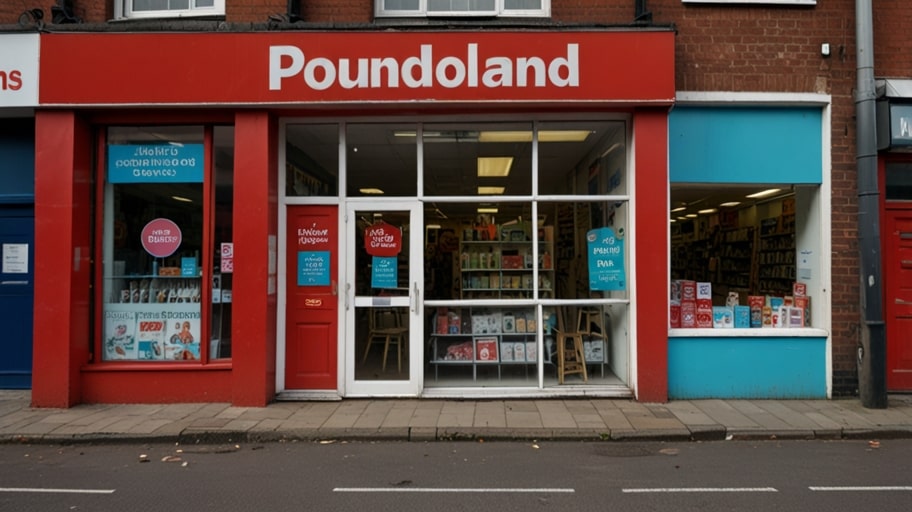
Poundland Sale Sparks Retail Crisis Fears in UK
The British shop market is in a new stream of trouble as one of the famous high-street stores, Poundland, has been auctioned off at a nominal price of one pound. The deal announced on Friday has left its customers worried about up to 100 store closures and thousands of layoffs, compounding the loss of consumer confidence.
A Distressed Retailer Giant
Poundland, a retailer of mostly budget products, has been struggling with increased expenditures and evolving consumer trends. The purchase by a private equity firm is a sign of a last-minute reorganization effort. Experts in the industry caution that the chain’s failure to intervene soon will result in its continued loss in a competitive market.
Economic Pressures Mount
The sale follows wider economic struggles as UK retailers struggle with higher taxes and uncertainties in global trade. Increased National Insurance payments and a pending threat of tariffs have also led to businesses disposing of jobs and reducing investments, which has had a knock-on effect throughout the high street.
Store Closures Loom Large
Rumours indicate that up to 100 Poundland stores are due to close, which would jeopardize the existence of thousands of its employees. Communities would be devastated, especially those depending on cheap retail. Customers were in disbelief, most of whom were afraid of having limited selections that would favor low-income families.
The Role of Private Equity is Questionable
The intentions of the private equity buyer are not clear, and asset-stripping speculation continues to flourish. The criticism leveled against such companies was that they always focused on short-term profits at the expense of sustainability, which resulted in the collapse of other UK retailers. The government is under pressure to deal with the influence of private equity on the sector.
Consumer Feeling Takes the Blow
Everyday shoppers who have already been feeling the jacking up of living standards are now left in an uncertain state about the future of Poundland. Social media was filled with grief and confusion as faithful customers lamented possible closure. The issue of declining high-street opportunities was likely felt by the majority of shoppers, with one of them saying his Poundland was the place he went to buy basic needs.
Crisis in the Retail Industry
The UK retail industry is stressed, as the high- and low-end property rates are supposed to jump to over 600 million GBP on large retailers. Together with the rise in tax and wage increments, the industry is in a superstorm. Lighter chains and independent stores are especially susceptible, which spells greater economic troubles.
Job Losses Add to Economic Strain
A sale that puts thousands of jobs at stake accentuates Poundland’s failing labor market. Unemployment has reached a four-year high of 4.6%, and employers are reluctant to hire. The ripple effect could reduce consumer spending, further dragging down the UK’s already shaky economic recovery.
Policy Criticism of the Government
Business leaders have frowned over the recent government recommendations that employers pay more tax. Retailers are content that these measures retard growth and discourage investment. There is an appealing growing outcry to provide reforms of the Employment Rights Bill in areas that are likely to relieve firms and give them confidence once again.
History of Poundland Threatened
A store like Poundland has existed since 1990, and its brand relies on low prices. Occupying a part of its potential deterioration is a more general movement of retailers due to the rise of online giants, including competitors established on discount terms such as Aldi. Analysts ask whether the chain has the ability to change and face a fast-changing consumer structure.
The Questionable Future of High Street
The high street has been in an existential crisis since it was the heart of UK communities. Poundland’s miseries are a replica of those of other retailers, as the availability of e-commerce has kept the margins slim, as have other rising expenses. Communities suffer, and cities and towns face the prospect of empty storefronts.
Turnaround potential
After the bleak forecast, others gain some hope. If the new owners modernize, a leaner Poundland will emerge. Efficiency and an improved online image may help reclaim the competitive edge, but it will all depend on how the company weathers the economic storm.
National Impact on the Community
The stores of Poundland commonly serve as the foundation of smaller towns, and their closure might annihilate the local economies. Customers in the countryside, who depend on the chain as a source of cheap merchandise, will have further commutes to other stores. The community leaders are encouraging people to support affected businesses and workers.
Wider Economic Implications
The sales indicate an underlying problem in the UK Economy, as GDP declined by 0.3 percent in April. Tax increases and trade tensions have affected the services and retail sectors most. To prevent consumer spending from further declining, economists are warning of a possible collapse in confidence.
Retailers are Cry Again
The industry groups demand government support, such as relief on business rates and tax breaks. The British Retail Consortium said that other chains would follow in the direction of Poundland unless helped. Retailers also seek cost-reduction models as a way of survival, but few of them are available.
A Survey of Strength
Following this crisis, Poundland will be an example of how UK retail can perform in the future. The stakeholders hope that they will be able to control this situation through a strategic overhaul to help save jobs and stores. One analyst pointed out that the high street requires more than survival; instead, it requires innovation and boldness.
Looking Ahead
The next few months will be decisive for Poundland and the retail industry in general. While the industry is presented with an exclusive opportunity, market tightening of consumer budgets and economic uncertainties prevail. It is too early to tell whether Poundland can turn around or whether it will join the list of other competition victims, though the situation is significant.



 Bitcoin
Bitcoin  Ethereum
Ethereum  Tether
Tether  XRP
XRP  USDC
USDC  Solana
Solana  TRON
TRON  Lido Staked Ether
Lido Staked Ether  Cardano
Cardano  Avalanche
Avalanche  Toncoin
Toncoin